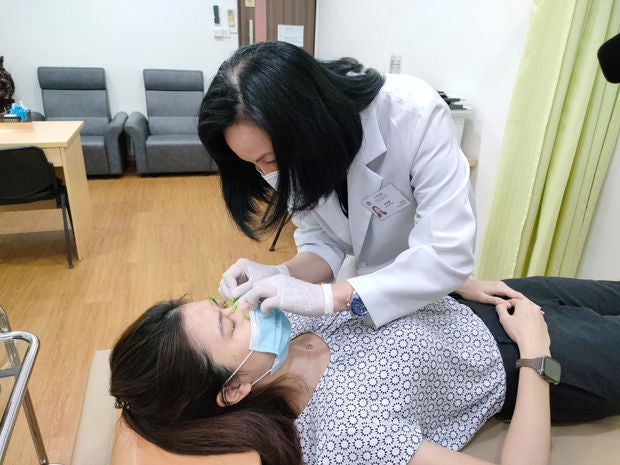
Clinical trial shows encouraging results in TCM treatment for dry eye.
A clinical trial by Singapore Eye Research Institute (SERI) and Singapore Chung Hwa Medical Institution (SCHMI) is recruiting peri- and post-menopausal women to evaluate the efficacy of traditional Chinese medicine (TCM) remedies for treating dry eye.
Studies done in the United States recorded the rate of dry eye disease in women over 50 years of age to be nearly double that of men in the same age group. This could be due to the hormonal changes experienced by women during and after menopause that are systemic conditions associated with dry eye.
TCM as a treatment for dry eye is not widely known. In reality, TCM practitioners in Singapore have been using herbal medication and acupuncture to treat dry eye for over 20 years. Other TCM treatment methods for dry eye include the use of warm eye masks, eye steaming, eye spa, as well as scraping, massage and moxibustion around the eye.

“The majority of patients with dry eye in Singapore have a mild to moderate form of the condition. Treating this group of patients in the primary care settings and holistic treatments like TCM help to keep treatment cost and care affordable. It also prevents the patients’condition from worsening, as peri- and postmenopausal women with dry eye issues tend to be associated with systemic conditions including insomnia, indigestion, emotional stress and anxiety, irritable bowel syndrome and not just local dry eye deficiency alone,” said Dr Pat Lim, Chief Physician and Board Vice Chairman at SCHMI, and the Principal Collaborator for this study. She is also Head of SCHMI’s TCM Ophthalmology Department.
In a study completed in 2017 by SERI and SCHMI, 15 dry eye participants were prescribed a lubricating eye gel and administered with eight sessions of acupuncture over four weeks (variable group), while another 15 participants used only the eye gel (control group). Sixty per cent of the participants in the variable group were found to have an increase in supportive proteins and a decrease in inflammatory proteins. On the other hand, only 27 per cent in the control group showed equivalent patterns of protein change. Based on these encouraging results, the current clinical trial has been expanded to study 150 peri- and post-menopausal women with symptoms of dry eye.
While dry eye is also prevalent in younger people, they are often non-systemic and attributable to environmental factors, such as prolonged screen time, exposure to air-conditioning, insufficient sleep or improper diets. These factors may be resolved without medication by making the necessary lifestyle changes.
Read more: Dry eyes are commonly caused by eye strain. Click here for eight easy ways to avoid eye strain.

“We see a significant number of periand post-menopausal women who are very symptomatic. About 70 per cent of patients are women and more than half are above 55 years old. Such patients are likely to benefit from conventional prescription drugs for dry eye such as
cyclosporine and
corticosteroids, but these treatments are not always effective because they do not address the underlying hormonal problems. We see an opportunity to employ new therapeutic modalities, such as TCM, to treat dry eye in these women,” said Professor Louis Tong, Principal Clinician Scientist and Head of the Ocular Surface Research Group, SERI, and Senior Consultant, Corneal & External Eye Disease Department, Singapore National Eye Centre.
Earlier research by SERI has led to standardisation of the acupuncture procedure and the development of a herbal supplement named Qi Ju Gan Lu Yin (杞菊 甘露饮) that can provide better therapeutic effects for dry eyes. Chrysanthemum, goji berries and baby ginseng are among the 11 ingredients in the supplement, which has been approved by Health Sciences Authority and is available for purchase at SCHMI.
From now till 31 August 2023, the clinical trial is recruiting 150 peri- and post-menopausal women between 40 to 79 years old with symptoms of dry eye such as eye irritation, burning or tearing. Those interested in participating in this trial of herbal medication for treating dry eye can email SERI’s research office at res.recruit@seri.com.sg or contact SCHMI at 6877 4203 or 8424 0546 (9am–5pm, Monday–Saturday).
Get the latest updates about Singapore Health in your mailbox! Click here to subscribe.













 Get it on Google Play
Get it on Google Play